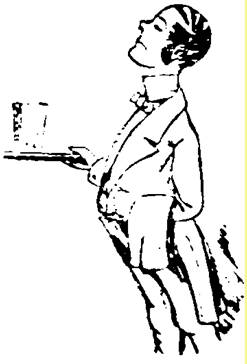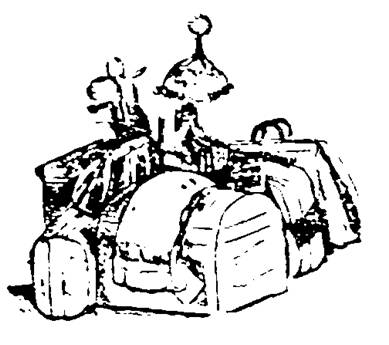This article has been transcribed from a copy of the Cardiff Times in the online collection of scanned Welsh newspapers 1804-1919 in the National Library of Wales, with grateful recognition of the free access accorded to all readers. Where necessary paragraph breaks have been introduced for easier reading. — David Skilton
White-collar workers of a certain seniority were increasingly allowed time off for a summer holiday. Many holiday-makers looked down on day-trippers, who had no holiday entitlement apart from the Bank Holiday, which is celebrated in ‘Samuel’s Sentiments’ for 15 August 1891. A holiday, says Samuel, allows the freedom to assume a temporary identity and tell tall stories. The paid summer holiday, belonging to a sizeable proportion of the working population, was a new phenomenon, made possible by the railway, and useful for mill-owners for routine maintenance as well as the well-being of the workforce. A holiday, says Samuel, allows the freedom to assume a temporary identity and tell tall stories.
I like summer holidays, sir; in fact, I like holidays at any season of the year, and as many of them as I can get, provided my salary is going on all the time. When I say that I like to “take” a holiday, sir, I mean it literally. If no one gives one, I simply help myself to it, and with a noble generosity to my own person, ‘give’ myself a holiday. When I start away for a holiday, I generally tell all my friends that I am about to bury myself — of course I don't mean that literally; I mean that duty to be performed by someone else at as remote a period as possible — far from the madding crowd; that I am going to seek some obscure retreat where no one knows me: where printers cannot pursue and where bailiffs bother not. With this virtuous intention do I start, and, journeying to this said retreat, wherever it may be, I inly chuckle that I am about to escape from the thraldom of a too conspicuous identity. Alas, sir, as a general rule I run right against some person who has for long being pressing me for ‘that little account,’ or I encounter the very friend whose temptingly convivial habits have induced me to fly from the circle wherein he moves. I have many rules to lay down about holidays. In the first place, never go with a friend. He always becomes a nuisance. You make new friends, at the seaside, say, and duly impress them with a sense of your great importance in your native place.

Abominable, Sir!
Your friend becomes confidential with them also, and tells them the real state of the case, and you feel very small. If he be a person of a thirsty nature, he lures you to more hostelries than would otherwise come within the scope of your observation. If he be of a churlish disposition he is a clog upon your own desires, and you are the victim of his ill-humours and when you get home again he will tell all your intimates you behaved most ‘unbecomingly’ or ‘shamefully, considering that you have grown-up daughters of your own.’ Then again there is the chance that he may be a nervous man, given to prowling about in the still watches of the night and tapping alarmingly at your bedroom door, and requesting that you will confide to him out of the storehouse of your knowledge some remedy for sleeplessness.

‘Can’t sleep a wink.’
Perhaps he may be a persistent borrower, in which case woe betide you! You will find that he has not quite sufficient money to I settle up the ‘little’ account (why are accounts so persistently referred to as ‘little’?) at the hotel, never to speak of not having sufficient cash for his fare home, and, besides these things, he will borrow all your clean collars, your razor, your suit of flannels, your tobacco, and goodness knows what besides. By no means take a friend. It is possible that if you like sailing, he does not; if you like climbing hills, he does not; if you would prefer the dolce far niente, he is all activity.

He ain’t a gent
He may, again, be a mean man — a man who will not, ‘on conscientious grounds,’ of course, pay the sum demanded for the hire of vehicles; a man who will [img3 right] be eternally disputing with landladies about ‘extras;’ a man to whom the waiters will take a rooted aversion, in consequence of which you will, being classed together be persistently neglected and despised. Beware of going away with a disputative or a too jocular man, for the one will quarrel with everybody you encounter, and the other will possibly lead you into some scrape by his excessive facetiousness. No, sir, holidays with friends are not in my line except such friends are men of substance, who ‘insist’ (of course you can't say ‘nay’ when they ‘insist’) upon paying all expenses, in which case one may venture to risk the ordeal. For my part I like to go a stranger amongst strangers.
One of the chief pleasures of a holiday is to tell bouncing, thumping Munchausen "stories" (I'll use no other word) to those you meet. Assume an air of mystery at first, sir, and by implication let it be impressed upon those whom you encounter that you are a person of some importance. Then you can bounce to your heart's content; you can revel in a magnificent field of fancy; you can be related in the nearest degree to at least one half the peerage; you can have hunted the bear in Iceland; you can have ascended the mighty Himalayas; you can have lived in Turkey or in Peru, or in distant Cathay, and if you are possessed of a little tact, considerable fluency, some effrontery, and a graphic style, you can excite the liveliest admiration and surprise, and greatly contribute to the pleasure of your chance acquaintances. You are sure to meet other members of the great Mandeville family, and your mendacity is sure to be rivalled. In such gentle rivalry it is indeed pleasurable to outlie everybody, and to return home with the proud consciousness that you are a very Tsar of taradiddle tellers. I invariably adopt this plan myself, sir, and I find that it keeps me in form for those works of fiction upon which I am habitually engaged.

Oh scissors; luggage!
As to whether a man should invariably take his wife with him on his holiday excursions, I may say, sir, that the authorities differ; there is a conflict of opinion regarding the matter; a little divergence of ideas, but it may be laid down that, as a general thing, it is cheaper to take one's wife with one (so long, that is, as she is alone and is not accompanied by your numerous progeny, or by her sister or her mother), but you must always put some limit upon the extent of her luggage. If she be a lady of preternaturally jealous disposition, by all means leave her at home — if she'll let you. If you take her, it is highly probable that there will be frequent differences of opinion, and your life will become a burden to you. She will insist that some ‘nasty, fast- looking thing’ distinctly recognised you on the pier; [img4 left ]she will say that she wishes she had stopped at home in order that you might enjoy yourself in ‘your own underhand way;’ she will frequently tell you that she doesn't know what girls are coming to now-a-days, with their flaunting ways, and she will pertinaciously insist on accompanying you everywhere. If she be a lady of an antagonistic disposition, my remarks regarding friends apply. She will say that she doesn't know how it is that men are always calling at inns on the road, when they go out for a day’s pleasure; she will discover that the lodgings are not clean; that you are a dupe I because you yourself took them; that you are always wanting to ‘give her the slip,’ and that you are a ‘selfish man’ because you left the children at home.

A nasty forward thing
But, after all, she will save you a lot of expense; she will look after things; she will prevent you from joining those little parties in which you meet female strangers, a portion of whose expense on the said trips you feel it incumbent upon you to discharge with a too lavish hand. Regarding this wife question, sir, there is indeed much to be said on either side. But I believe the prevailing view is that a married man ought not to go to the seaside without his wife. Husbands, bear this in mind. On holidays, sir, it is always wise to avoid the man who is ‘only waiting for remittances to get back home; could you oblige for a few days,’ &c. -- you know. It is good also to keep out of the way of the elderly gentleman who insists upon accompanying you everywhere; and never, as you value your peace of mind, let a crush at any lodging-house or hotel induce you to share a double-bedded room with a stranger, for he may suffer from asthma, or be in that incipient condition of ‘D. T.’ [delirium tremens vulgarly known as the ‘jim-jams,’ in which case you may some night wake I up and find that he is playfully bending over your peaceful couch with a razor in his hand. It is highly probable that he will snore; and there is a possibility that he may not fully comprehend the rights of property — may not know the difference between meum and tuum. Had space permitted sir, I should have had much to say regarding what I may call ‘holiday humbugs,’ such as the man who, when his holiday has nearly expired, telegraphs home to his confiding employer to the effect that he has had the misfortune to sprain his ankle, and cannot, therefore, stir for some days. My attention likewise in this category would have been directed to a minute description of the man who comes to a sea-side place by a day trip, and then unblushingly assures you that he has come to stop for a month — ‘if he likes the place.’ Should you ever meet such a man, sir, disconcert him by telling him that ‘if he likes the place he ought by all means to buy it.’ He will know what you mean. Another humbug I abominate, sir, is the man who can't bear such and such a place ‘because it is so much patronised by low trippers, you know.’ But here am I, prating away about holidays — ‘dash it all,’ as the man in the piece says [the play is not traced] -- I think I'll take one; that is if you behave with that noble generosity which is so essentially a part of your character. You know my address; the bearer will wait for an answer. I prefer all cheques uncrossed. Ta, ta; by-bye:
Links to Related Material
- Victorian Leisure Activities
- The Seaside in the Victorian Literary Imagination
- Seaside Resorts
- The Mistake of Going on Holiday: Travel, Tourism and Leisure in Early and Mid-Victorian Illustration
Last modified 5 December 2021